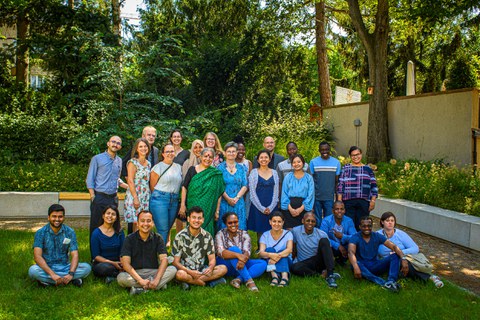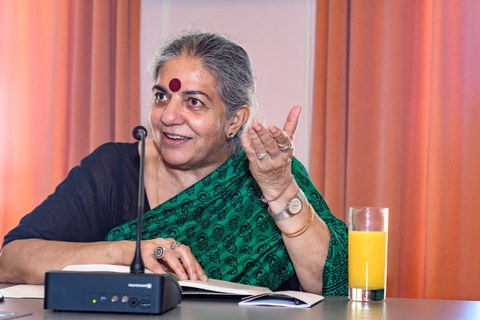31.07.2022
Rückblick: Besuch der Nachhaltigkeitsaktivistin und Gewinnerin des Hans-Carl-von-Carlowitz Nachhaltigkeitspreises 2021, Dr. Vandana Shiva
Die Trägerin des Hans-Carl-von-Carlowitz Nachhaltigpreises 2021, Dr. Vandana Shiva, besuchte am 27. Juni 2022 auf ihrem Weg zur Preisübergabe in Chemnitz gemeinsam mit Gästen der Sächsischen Carl-von-Carlowitz-Gesellschaft e.V. die TU Dresden, um mehr über die Aktivitäten der Universität im Bereich Nachhaltigkeit zu erfahren und mit den Akteur:innen ins Gespräch zu kommen.
Dr. Vandana Shiva wurde bereits vielfach für ihr Engagement im Umweltschutz und Frauenrecht ausgezeichnet. Neben ihrer Auszeichnung mit dem Hans-Carl-von-Carlowitz Nachhaltigkeitspreis 2021 ist sie auch Trägerin des Right Livelihood Award 1993 sowie Gründungsmitglied des World Future Council und Mitglied der Internationalen Organisation für eine Partizipatorische Gesellschaft. In ihrem Wirken verbindet sie Geschlechtergerechtigkeit mit Ökologie und Globalisierungskritik.
Die Veranstaltung anlässlich ihres Besuchs im Festsaal des Rektorats startete nach einer Begrüßung und der Gelegenheit zum Mittagessen mit einem Beitrag von Prof. Uta Berger, die in ihrer Funktion als Wissenschaftliche Leiterin des Centre for International Postgraduate Studies for Environmental Management (CIPSEM) erläuterte, wie junge Entscheidungsträger:innen aus dem Globalen Süden in Weiterbildungskursen von- und miteinander lernen, in ihren Positionen noch stärker zu einer Nachhaltigkeitswende beizutragen.
Anschließend erklärte Dr. Dieter Füsslein, Vorsitzender der Sächsischen Hans-Carl-von-Carlowitz-Gesellschaft e.V. zur Förderung der Nachhaltigkeit, wie Hans Carl von Carlowitz bereits zu Beginn des 18. Jahrhunderts mit dem von ihm beschriebenen Dreieck der Nachhaltigkeit aus ökologischem Gleichgewicht, ökonomischer Sicherheit und sozialer Gerechtigkeit erstmals die bis heute gültigen Prinzipien der Nachhaltigkeit formulierte.
Nach einer Kickstart-Rede von Dr. Vandana Shiva, in der sie betonte, dass all unsere Bemühungen, mehr Nachhaltigkeit zu erreichen, auf den Gedanken und Handlungen vieler Einzelpersonen und Gesellschaften aufbauen, stellte Prof. Edeltraud Günther die Zielstellung und einige der Aktivitäten von PRISMA, dem Zentrum für Nachhaltigkeitsbewertung und -politik der TU Dresden vor. Schließlich berichtete die Inhaberin der an der Fakultät Wirtschaftswissenschaften neu eingerichteten Hans Carl von Carlowitz Juniorprofessur für Nachhaltigkeitsbewertung und -politik, JProf. Dr. Samanthi Dijkstra-Silva, von ihrem Vorhaben, in ihren Forschungen zur Nachhaltigkeitsbewertung speziell darauf einzugehen, was Individuen hemmt bzw. darin bestärkt, im persönlichen und professionellen Umfeld zu mehr Nachhaltigkeit beizutragen.
Im anschließenden Gespräch mit den anwesenden Gästen, unter denen auch die aktuellen Teilnehmenden der CIPSEM-Kurse sowie Mitglieder von UNU-FLORES waren, betonte Dr. Vandana Shiva, die sich in ihrer Forschung ausgehend von der Situation in ihrem Heimatland Indien auch intensiv mit nachhaltiger Landwirtschaft auseinandergesetzt hat, noch einmal die Rolle von einzelnen Akteur:innen im Bestreben nach mehr Nachhaltigkeit. So haben hunderte Kleinbauern, die einen Landstrich unter Förderung der biologischen Diversität und geringeren Umweltkosten bewirtschaften, mit ihrem lokalen Wissen durchaus eine große und großräumige Bedeutung für die Transformation der Gesellschaft und müssen auch politisch angemessen repräsentiert werden. Hier sieht sie eine der großen demokratischen Herausforderungen unserer Zeit.
Besonders bemerkenswert waren Dr. Vandana Shivas Bemerkungen zur zunehmenden Unsicherheit in unserer Zeit. Sie betrachtet Unsicherheit als untrennbaren Bestandteil des Lebens, der immer auch eine Chance und einen Freiheitsgewinn darstellt. Diese Unsicherheit als etwas Natürliches anzunehmen, steigert die persönliche Resilienz gegenüber politisch oder wirtschaftlich instrumentalisierter Angst. Den jungen Entscheidungsträger:innen im Raum gab sie als Anregung mit auf den Weg, neue und kreative Wege zu finden, Selbstfürsorge (‚care‘) mit der Unterstützung (‚care‘) Anderer und unserer Erde zu vereinbaren.

Dr. Vandana Shiva zum Abschluss des Austausches mit Teilnehmer:innen des 45th UN-EP/UNESCO/BMUV International Postgraduate Course on Environmental Management for Developing Countries (EM45), Dr. Füsslein von der Hans-Carl-von-Carlowitz-Gesellschaft e.V. zur Förderung der Nachhaltigkeit (hinten links) sowie Vertreter:innen der TU Dresden und von UNU-FLORES.

